- Home
- Mary Downing Hahn
The Girl in the Locked Room Page 2
The Girl in the Locked Room Read online
Page 2
“Just look at those marble fireplaces,” Mom said. “Can’t you picture velvet drapes, crystal chandeliers, polished tables, carpets, paintings on the walls. . . . I can just imagine the people who lived here, women in long dresses, bearded gentlemen.”
“Maybe you could use the house as a setting for your next book,” Dad said.
“What a great idea. I’ve always wanted to write a historical novel. Maybe a ghost story or a gothic mystery.” Her voice trailed off, as if she were thinking about the possibilities.
“You need to finish the one you’re working on now,” Dad reminded her.
Mom sighed. “I’m so tired of coming up with new mysteries for Inspector Turner to solve.”
She took a step, and the floor groaned under her feet.
“Careful.” Dad rocked on his heels and bounced. The boards creaked under his weight but held firm. “The floor’s fairly solid here, but it’s caved in elsewhere.” He glanced at me. “It’s strictly off-limits to you, Jules. Don’t get any ideas about exploring.”
I looked at Dad in wonder. Did he actually think I’d set foot in this terrifying place by myself?
“How old is Oak Hill?” Mom asked.
“When I looked at the property last month, I visited the county courthouse and did some research—land records, wills, census returns,” Dad said. “I like to get a feeling for a house—when it was built, who lived there, that sort of thing. A man named Pettifer built Oak Hill in 1786.”
“When was it abandoned?” I asked.
“Sometime after the 1880 census was taken,” Dad said. “Henry Bennett and his family lived here then. That’s the last reference I found.”
“Where did they go?” I asked. “What happened to them?”
“I doubt anyone living today could answer that question.”
Mom sneezed three times in a row. “The dust and mildew are getting to me,” she said. “Let’s go see our living quarters.”
Dad led us into a room that once must have been a kitchen. A stained and rusty sink lay on the floor as if it had simply fallen off the wall. Rusty pots and pans had been swept into a corner along with broken china and odds and ends of rubble. Vines crept through cracks in the plywood covering the windows. The bones of a small animal lay in another corner.
Unlocking a new door with a modern key, Dad ushered us into a sunny kitchen. A sliding glass door led to a deck overlooking a field and the woods beyond. Light spilled from skylights in the family room ceiling. In one corner was a big fireplace made of stone.
“Oh, Ron,” Mom said, “it’s beautiful. I love it!”
It was definitely better than the old house, but it shared a wall with it—which meant it was too close to those dark, empty rooms for me. Sometimes we lived in an apartment in town while Dad worked on a house. I liked that arrangement better.
Our furniture was already in place, moved here by Stonybrook. All we had to do was unload the truck and bring in our suitcases and boxes of personal things that Mom hadn’t trusted to a moving company.
My bedroom was across the hall from Mom and Dad’s. Light poured through a floor-to-ceiling window and a skylight, something I’d wanted all my life. I moved one of my twin beds under it so I could look up at the stars and the moon before I fell asleep.
Thanks to Dad’s job, we’d moved in and out of many houses, so I was a pro when it came to organizing my things. In less than an hour, I’d put my clothes away, unpacked my books, and charged my iPad.
Last of all, I made my bed and lay down, tired from the long drive from Ohio to Virginia.
From where I lay, I could see the back of the old house from my window. My eyes moved from one boarded-up window to the next, first floor to second floor to third floor, where the windows were smaller.
Oddly, one window hadn’t been boarded up. Its small panes caught the afternoon light.
Something moved behind the glass but disappeared so quickly, I wasn’t sure what I’d seen. I blinked and looked again. Nothing moved.
I told myself it must have been a trick of the light, a reflection, my imagination, but I wasn’t convinced. I’d seen something at that window, just as I’d sensed something listening when Dad showed us the house. We weren’t alone in Oak Hill.
Suddenly I didn’t want to be alone in my room, scaring myself with silly thoughts. Turning my back on the house and its secrets, I went looking for Mom and Dad.
Mom was in the kitchen, putting the finishing touches on a salad, and Dad was carving the roasted chicken we’d bought before we turned off the highway.
“You’re just in time,” Dad said. “We’re having dinner outside on the deck.” He gestured at the sliding glass doors, open to the fresh evening air. “Our first meal at Oak Hill.”
“Maybe tomorrow we’ll find a good place for a picnic,” Mom said. “What do you two think?”
“Definitely a picnic,” I said, “in a meadow by a stream.”
“A meadow by a stream.” Dad smiled. “How do you know we’ll find a place like that?”
I shrugged. “It just popped into my head.”
While we ate, I pictured us sitting under a willow tree, listening to water running over pebbles and stones. We’d watch minnows and those funny long-legged water bugs. Gerridae, my sixth-grade science teacher called them. I saw the scene so vividly it seemed like a memory of something I’d done.
“Well, what do you think of our accommodations, Jules?” Dad asked. “A lot better than that dingy apartment in Cleveland, right?”
“Not to mention the Chicago third-floor walkup,” said Mom, “or the house with the leaky roof in Indiana.”
“It’s nice,” I said, “but if you want to know the truth, I’d rather live in town.”
“What do you mean, honey? This is a great place,” Dad said. “And it’s provided at no cost by the corporation. We don’t often get free housing.”
Mom waved her arm at the woods behind the house. Tall trees hid the shopping centers strung along the highway and muffled the traffic’s roar. “Just look at that view. Why on earth would you want to live in town?”
“In town, there’s stuff to do—a swimming pool, a library, movie theaters, kids my age. I’ll never make any friends out here. When school starts, I won’t know a single soul!”
“It’s only a fifteen-minute drive into Hillsborough,” Mom said. “We can go anytime you want.”
“But that’s not all. Oak Hill is right outside my bedroom window. It’s ugly and dark and scary, and I hate it.”
Dad leaned across the table and patted my hand. “It’s only temporary, Jules. In another year or so, we’ll be living somewhere else.”
“But Dad, that’s just the point. I’ve told you over and over again how sick I am of changing schools and losing friends and getting behind on stuff. It’s not fair, Dad. I want to live like ordinary people, not like some kind of nomad.” I glared at him. It was the angriest I’d ever been with him. “This house is just the last straw!”
Dad started to say something, but I wasn’t finished. “Cleveland, St. Louis, Detroit, Chicago, Philadelphia, St. Paul, Baltimore—” I said. “They all run together in my head. I can’t remember how many houses we’ve lived in or all the schools I’ve gone to.”
I fought to keep myself from crying. Why couldn’t they understand what it was like for me? Always the new girl, always trying to fit in, wearing the wrong clothes, making friends just to leave them behind and start all over again somewhere else.
Mom looked at Dad. “Maybe we should think about what Jules is saying. She’s almost thirteen, Ron. It’s hard for her to change schools every year. She needs to settle down and make friends.”
Dad sighed and took a few swallows of iced tea. “When I was your age, Jules, I couldn’t wait to grow up and get out of Plainsville. The day I left for college . . .”
Long before Dad stopped talking, I stopped listening. I’d heard it all before. His boring hometown, his father’s boring job running a furnitu
re store, his mother’s boring bridge club, his aunts and his uncles, his neighbors, all stuck in the same boring routines year after year. Most of them had never been more than a hundred miles from home. In their eyes, Plainsville had everything any human being needed. The outside world was a dangerous place.
That life hadn’t been for Dad. He’d seen most of the world by the time he was twenty-five. You’d think by now he’d be ready to settle down, but oh, no, he was still on the road.
Mom interrupted him. “But Ron, couldn’t you at least consider—”
“I go where the work is, you know that.” He poured himself another glass of iced tea. “Restoring old buildings is my passion. When I have a chance to renovate a grand house like this one, how can I say no?”
Too annoyed to say another word, I watched the moon rise over the darkening field. The clouds had blown away, and a nearly full moon hung just above the treetops. The sky was studded with stars, more than I’d ever seen.
I pictured the mysterious Bennett family looking at the same stars and the same moon. They’d heard the chorus of cicadas in the trees, they’d seen the flash of lightning bugs in the woods, they’d felt the evening breeze cool their skin. Just like I did now.
I imagined the Bennetts strolling across the field—a man, a woman, and maybe a daughter, a family like mine, enjoying a summer night. They seemed to step from my imagination into the real world. The man said something, and the little girl laughed. I stared at them, entranced, convinced now that they were real people, out for an evening walk.
Just as I was about to beckon them to join us, Dad yawned loudly. The family immediately disappeared into the woods.
Perplexed, I turned to Mom. “Did you see those people?”
“Where?” She peered at the field. “I don’t see anyone out there.”
“They’re gone now, but they were just there.” I pointed to the spot. “A man, a woman, and a little girl.”
Dad shook his head. “No one lives within miles of this place, Jules.”
“But I’m sure—”
“Your eyes were tricked by shadows,” Mom said. “You saw a bush, a small tree, that’s all.”
Maybe that was it. I was tired, and it was hard to focus without much light. But still—they seemed real when I saw them. And I’d heard the girl laugh.
I looked again at the edge of the field. The family must have taken a path into the woods. If they’d really been there, that is. Dad was right. No one lived near Oak Hill. Where had they come from? Like Mom said, my eyes must have been tricked by the darkness.
Dad swatted a mosquito. “It’s a long drive from Ohio to Virginia.” He yawned again. “I don’t know about you two, but I’m ready for bed.”
Mom gathered up the paper plates and cups, and Dad and I helped her carry everything inside. We dumped the remains of dinner into the trash. No dishes to wash tonight.
Dad yawned again. “The crew arrives at eight a.m. tomorrow to start work,” Dad reminded us. “Better be up, dressed, and ready.”
Mom groaned and followed him into their bedroom.
Too tired even to open a book, I undressed quickly, fell into bed, closed my eyes, and went to sleep.
Long before daylight, a loud noise woke me. Thunder, I thought at first, but no, that wasn’t it. As the noise grew louder, I realized it was the sound of horses galloping toward the house. On they came, two or three of them, running fast and hard though the dark. A man shouted in anger, a woman called out in fear.
Frightened, I sat up and peered out my window. The moon threw shadows everywhere, slicing the night into a confusing pattern of blacks and whites. I saw no horses, no riders. I heard nothing but the wind in the trees and the bang bang bang of a loose shutter striking the side of the old house. If horses and riders had come this way, the darkness had swallowed them up.
I slid under the covers and shivered, not just from the cool night air but also from fear. What was going on? I hadn’t been at Oak Hill for twenty-four hours, and I’d already seen something move at a window on the third floor, watched a family crossing a field at twilight, and heard the steady beat of horses’ hooves pounding toward the old house.
The night was silent now. Nothing moved. Yet a presence lingered in the stillness. I wanted to run across the hall to my parents’ room and tell them what I’d seen, but I knew they’d say I was dreaming.
Maybe they were right. Maybe not. Either way, they’d be annoyed if I woke them up in the middle of the night.
Maybe tomorrow I’d talk to Mom and Dad. Maybe they’d heard the horses too. Maybe they’d believe me. . . . Maybe they wouldn’t.
Finally, too exhausted to worry about what Mom and Dad would or would not believe, I curled up like a child, shut my eyes, and fell asleep.
4
The Girl
The girl stands at the window and peers down at the addition. A light goes on. She draws back, frightened. The light isn’t soft, like the glow from a candle or a kerosene lamp, but harsh and more brilliant than any she’s ever seen.
A girl, a big girl, walks past the window. She has long dark hair, and she’s tall.
Once, she thinks, long ago, she might have had friends like that dark-haired girl. She can’t recall their faces or names or what they said, but she thinks that sometimes they laughed together. It’s been a long time since she’s had anything to laugh about.
Maybe they were never real, those friends. It’s hard to be sure of anything except this room and what she sees from the window.
But the dark-haired girl in the addition is definitely real. She watches her move around her room, then change her clothes and get into bed.
Once, the girl in the locked room must have slept, but not now. She’s tired all the time, but never sleepy. Just sad and scared and lonely.
The light in the room goes out; the girl is alone again.
She watches the dark-haired girl’s window long after the light goes out. The moonlight is bright on the wall of the addition, but it casts dark shadows on the grass beneath her window.
Suddenly she steps back into the shadows. Now is the time of night when they come, she thinks, and sure enough, no sooner has she thought it than she hears the horses. Their hooves pound the earth. A man yells. A woman cries out in fear.
She senses that the dark-haired girl is awake and frightened. She wishes she could tell her that the men are not after her. It is the girl in the locked room the men want.
They’re at the kitchen door now. Soon they’ll come upstairs. She scurries to the wardrobe and hides in her nest.
While the men shout, while the woman waits in the yard, she comforts herself by thinking about the dark-haired girl. Perhaps she’ll see her in the morning. She’ll watch her and learn about her. Perhaps the girl is the one she waits for. Perhaps she will rescue her. Perhaps she will free her from this room.
5
Jules
The foreman of Dad’s crew and two of his assistants arrived just after breakfast. They spread out plans on the kitchen table and began talking about the morning’s work.
Dad looked at Mom. “Why don’t you and Jules go for a walk? Maybe you’ll find that stream and we’ll have a picnic there.”
Mom turned to me with a smile, and we left Dad to pore over his plans with his crew.
Not sure where we wanted to go, we wandered across a field and found a narrow path that led downhill through a field of wildflowers.
At the bottom of the hill, Mom stopped. “Listen. I hear water running, a creek or a stream. Let’s find it.”
We ran through the weeds and ducked under the branches of a willow tree. A shallow stream, almost wide enough to be a river, ran past.
Mom kicked off her sandals and splashed into the water near the bank. The water was so clear I could have counted the stones on the sandy bottom.
Mom held her hand out to me. “Come on, Jules. The water’s a little cold, but it’s only ankle-deep here.”
When I hesitated, she laughed
and kicked water at me.
“Stop it.” I drew back. “Come out of there.”
“Look.” She pointed at a school of minnows swimming past. “And water striders.”
“Their official name is Gerridae,” I told her.
“Where on earth did you learn that?”
“Last year, from my sixth-grade science teacher.”
Mom laughed. “Well, I’m going to call them water striders. It suits them better.” She leaned over and watched the insects move across the stream’s smooth surface. “Gerridae indeed.”
Suddenly she grabbed my hands and pulled me into the water.
“Mom!” I shouted. “I still have my shoes on!”
“They’re rubber flip-flops. It won’t hurt them to get wet, and it won’t hurt you either.”
“The stones are slippery. I’m going to fall.”
“Goodness, Jules, don’t be such a scaredy-cat.” Mom took my hand and led me deeper into the water. It wasn’t as bad as I’d feared. Sunlight splashed down through the willow leaves. Minnows darted around us, their silver bellies flashing as they turned, and the Gerridae walked in circles on the still water near the shore. If I slipped and fell, I’d get wet, but I wouldn’t drown. The day was so hot, it might even feel nice.
Mom smiled. “It’s fun, right?”
I laughed and splashed her. She splashed me. I splashed back. By the time we hauled ourselves out of the stream, our jeans were soaked to our hips and we were laughing so hard we could hardly walk.
“Let’s bring Dad next time,” Mom said. “It’s the perfect spot for a picnic.”
It was perfect, almost too perfect. I’d imagined a place like this, and here it was—exactly as I’d pictured it. The stream, the willow tree, the field. I felt as if I’d waded in the stream before, watched the Gerridae and the minnows, seen the sun shine through the willow’s leaves. When a rabbit hopped into sight, I knew he’d disappear into a thicket of honeysuckle.

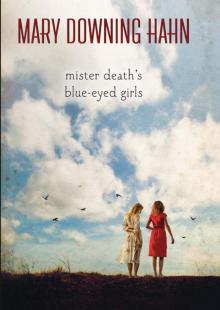 Mister Death's Blue-Eyed Girls
Mister Death's Blue-Eyed Girls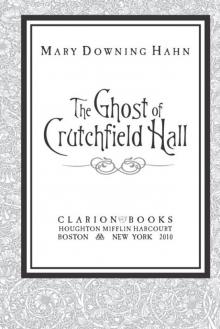 The Ghost of Crutchfield Hall
The Ghost of Crutchfield Hall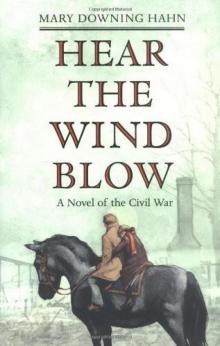 Hear the Wind Blow
Hear the Wind Blow Time of the Witch
Time of the Witch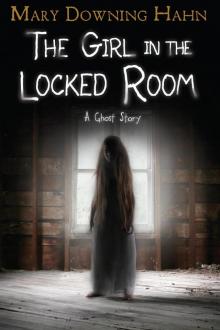 The Girl in the Locked Room: A Ghost Story
The Girl in the Locked Room: A Ghost Story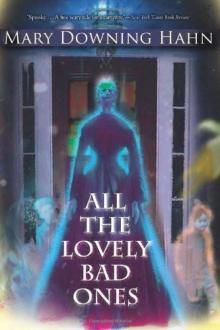 All the Lovely Bad Ones
All the Lovely Bad Ones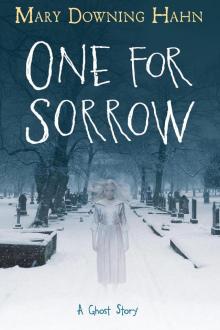 One for Sorrow
One for Sorrow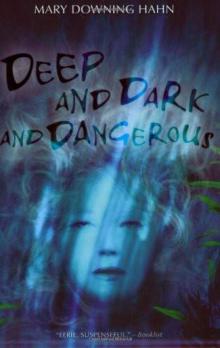 Deep and Dark and Dangerous
Deep and Dark and Dangerous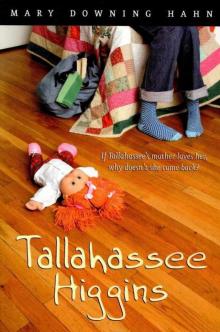 Tallahassee Higgins
Tallahassee Higgins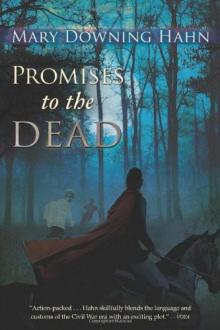 Promises to the Dead
Promises to the Dead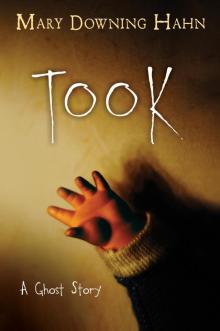 Took: A Ghost Story
Took: A Ghost Story Following My Own Footsteps
Following My Own Footsteps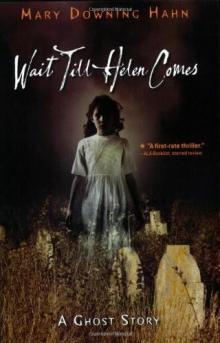 Wait Till Helen Comes: A Ghost Story
Wait Till Helen Comes: A Ghost Story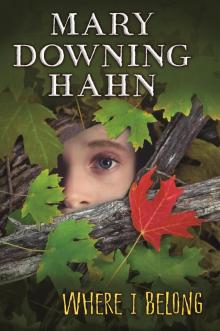 Where I Belong
Where I Belong The Spanish Kidnapping Disaster
The Spanish Kidnapping Disaster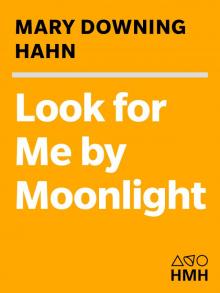 Look for Me by Moonlight
Look for Me by Moonlight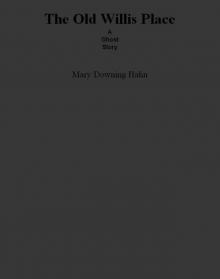 The Old Willis Place
The Old Willis Place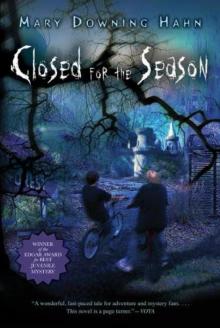 Closed for the Season
Closed for the Season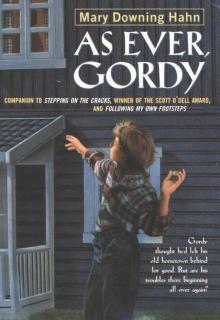 As Ever, Gordy
As Ever, Gordy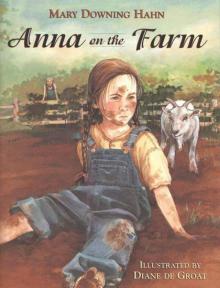 Anna on the Farm
Anna on the Farm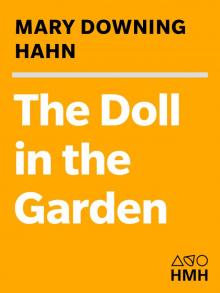 The Doll in the Garden
The Doll in the Garden Daphne's Book
Daphne's Book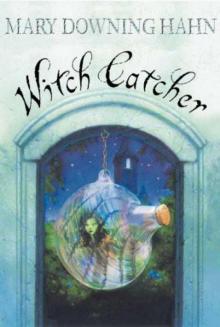 Witch Catcher
Witch Catcher The Gentleman Outlaw and Me--Eli
The Gentleman Outlaw and Me--Eli Wait Till Helen Comes
Wait Till Helen Comes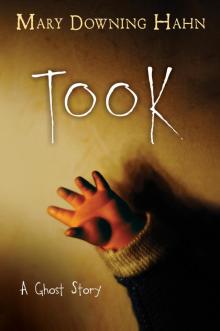 Took
Took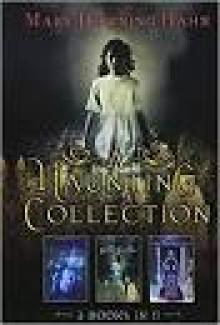 A Haunting Collection
A Haunting Collection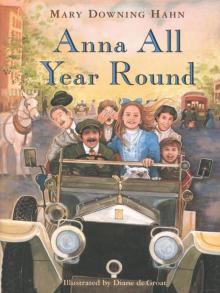 Anna All Year Round
Anna All Year Round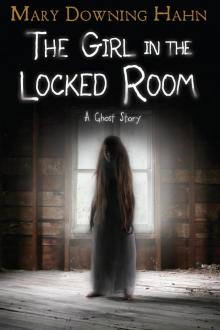 The Girl in the Locked Room
The Girl in the Locked Room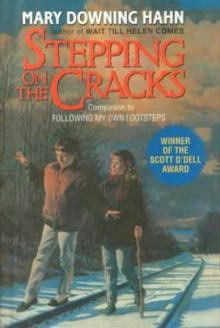 Stepping on the Cracks
Stepping on the Cracks